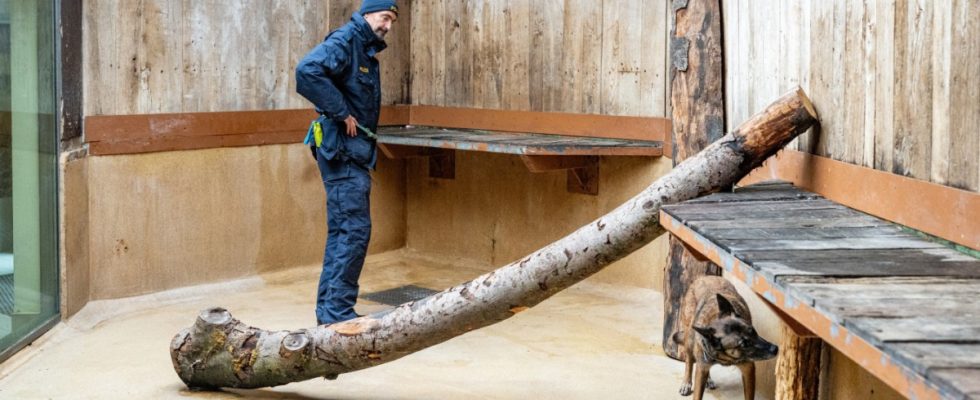Laky senses danger. He stretches himself out, moves slowly and carefully, sniffs the ground. The dog seems tense, perhaps even afraid – but duty is duty. It has to be here somewhere, this explosive, and even if it smells dangerously dangerous like an animal that is significantly bigger than him – he has to find it.
Laky is one of around 100 explosives detection dogs in the Bavarian police and is undergoing further training. This Wednesday in February there is a very special training on the program: explosives sniffing in the lion and tiger enclosure at the Straubing Zoo. Several times a year, dogs and their owners from the Bavarian Police’s Central Service Dog School train in the big cat cage.
“This is an extreme situation for the dogs,” says trainer Christian Pauler. The smells of the lions and tigers seemed threatening and the dogs knew exactly that somewhere nearby there must be animals that are significantly larger than themselves. And then there are cats too. “The dogs are stressed.” Leftover meat in the lion cage adds to the distraction.
Pauler is a service dog handler himself. His oldest dog will soon be eleven years old and is therefore close to retirement. Timber, with whom he is training in the enclosure that day, is only two and a half. Dogs can be trained to be service dogs when they’re about a year and a half old, he says. There are around 300 of them in Bavaria. In addition to the approximately 100 explosives detection dogs, there are also people search dogs, corpse detection dogs and drug detection dogs, which are usually trained at the same time as banknote detection dogs because drugs and money are often close together, as Pauler says.
The explosives detection dogs, on the other hand, are conditioned exclusively to explosives, because it makes a big difference whether they sniff out a possibly ticking bomb or relatively harmless cash lying around. Once they have sniffed out the explosives – or the training material – they are supposed to stand still, and some even lie down. If this works well, there is a reward from the human colleague.
“Female dogs often have an easier time in the big cat enclosure than male dogs,” says Pauler – and as if to prove this, the next training candidate, five-year-old Malu, trips through the lion cage curiously – and almost fearlessly compared to her male colleagues . She is otherwise on duty at the Munich Security Conference or searches the festival tents before the rush of visitors to the Oktoberfest, as Lionel Kroker says. The 35-year-old has been a service dog handler since March 2020 and now forms a well-rehearsed team with Malu.
But the predator enclosure is not only a welcome training ground for the dog school – the zoo also benefits from it, as zoo director Michel Delling says. The zookeepers would otherwise have a lot to do with keeping the lions and tigers occupied with different smells, such as zebra droppings, curry powder or perfume. “But if the dogs were here, the lions had to spend a long time marking their territory again. So it also makes our work easier.”

